
St. Paul's Lutheran Church is a church located in Ashland, Kentucky and is affiliated with the Lutheran Church - Missouri Synod. [1]

St. Paul's Lutheran Church is a church located in Ashland, Kentucky and is affiliated with the Lutheran Church - Missouri Synod. [1]
St. Paul's Lutheran Church began in 1866 [1] by German immigrants. Its original location was on the corner of 14th Street and Winchester Avenue, and Rev. Gustav Baum served as the initial pastor through 1871. Church services were in German originally. [2] The churches records from 1866 to 1892 were written in German, and have been translated into English. [3]
A group of German immigrants who had been worshipping together took an offer by the Kentucky Iron, Coal, and Manufacturing Company to obtain a lot to build a church. [4]
The church was relocated in 1951 to its current location on Bath Avenue. St. Paul's celebrated its 150th anniversary in 2016. [4]

The Lutheran Church – Missouri Synod (LCMS), also known as the Missouri Synod, is a traditional, confessional Lutheran denomination in the United States. With 1.8 million members, it is the second-largest Lutheran body in the United States, behind the Evangelical Lutheran Church in America. The LCMS was organized in 1847 at a meeting in Chicago, Illinois, as the German Evangelical Lutheran Synod of Missouri, Ohio, and Other States, a name which partially reflected the geographic locations of the founding congregations.
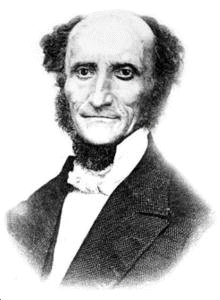
Carl Ferdinand Wilhelm Walther was a German-American Lutheran minister. He was the first president of the Lutheran Church – Missouri Synod (LCMS) and its most influential theologian. He is commemorated by that church on its Calendar of Saints on May 7. He has been described as a man who gave up his homeland for the freedom to speak freely, to believe freely, and to live freely, by emigrating from Germany to the United States.

Concordia Seminary is a Lutheran seminary in Clayton, Missouri. The institution's primary mission is to train pastors, deaconesses, missionaries, chaplains, and church leaders for the Lutheran Church–Missouri Synod (LCMS). Founded in 1839, the seminary initially resided in Perry County, Missouri. In 1849, it was moved to St. Louis, and in 1926, the current campus was built.

Seminex is the widely used abbreviation for Concordia Seminary in Exile, which existed from 1974 to 1987 after a schism in the Lutheran Church–Missouri Synod (LCMS). The seminary in exile was formed due to the ongoing Fundamentalist–Modernist Controversy that was dividing Protestant churches in the United States. At issue were foundational disagreements on the authority of Scripture and the role of Christianity. During the 1960s, many clergy and members of the LCMS grew concerned about the direction of education at their flagship seminary, Concordia Seminary, in St. Louis, Missouri. Professors at Concordia Seminary had, in the 1950s and 1960s, begun to utilize the historical-critical method to analyze the Bible rather than the traditional historical-grammatical method that considered scripture to be the inerrant Word of God.

The Evangelical Lutheran Synodical Conference of North America, often known simply as the Synodical Conference, was an association of Lutheran synods that professed a complete adherence to the Lutheran Confessions and doctrinal unity with each other. Founded in 1872, its membership fluctuated as various synods joined and left it. Due to doctrinal disagreements with the Lutheran Church–Missouri Synod (LCMS), the Evangelical Lutheran Synod (ELS) and the Wisconsin Evangelical Lutheran Synod (WELS) left the conference in 1963. It was dissolved in 1967 and the other remaining member, the Synod of Evangelical Lutheran Churches, merged into the LCMS in 1971.
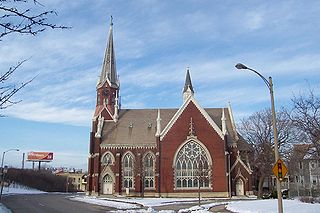
St. Stephen Lutheran Church, or Iglesia Luterana San Esteban, is a designated Milwaukee Landmark. It is in the historic Walker's Point district of Milwaukee, Wisconsin.
The Evangelical Synod of North America, before 1927 German Evangelical Synod of North America, in German (Deutsche) Evangelische Synode von Nord-Amerika, was a Protestant Christian denomination in the United States existing from the mid-19th century until its 1934 merger with the Reformed Church in the United States to form the Evangelical and Reformed Church. This church merged with the Congregational Christian Churches in 1957 to create the United Church of Christ.
The Lutheran School of Theology at Chicago (LSTC) is a seminary of the Evangelical Lutheran Church in America in Chicago, Illinois. LSTC is a member of the Association of Chicago Theological Schools (ACTS), a consortium of eleven area seminaries and theological schools. It shares the JKM Library and portions of its campus with McCormick Theological Seminary. LSTC is accredited by the Association of Theological Schools and regionally accredited by the Higher Learning Commission.
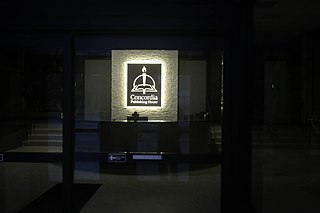
Concordia Publishing House (CPH), founded in 1869, is the official publishing arm of the Lutheran Church–Missouri Synod (LCMS). Headquartered in St Louis, Missouri, at 3558 S. Jefferson Avenue, CPH publishes the synod's official monthly magazine, The Lutheran Witness, and the synod's hymnals, including The Lutheran Hymnal (1941), Lutheran Worship (1982), and Lutheran Service Book (2006). It publishes a wide range of resources for churches, schools, and homes and is the publisher of the world's most widely circulated daily devotional resource, Portals of Prayer. Its children's books, known as Arch Books, have been published in millions of copies. Concordia Publishing House is the oldest publishing company west of the Mississippi River and the world's largest distinctly Lutheran publishing house.
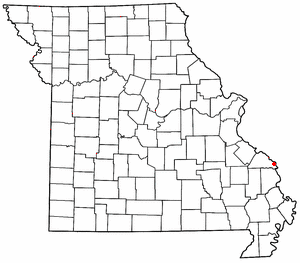
Wittenberg is an unincorporated community in Brazeau Township in eastern Perry County, Missouri, United States. It is located on the Mississippi River, 14 miles (23 km) southeast of Perryville. Wittenberg is situated in the Brazeau Bottoms on Brazeau Creek opposite Grand Tower, Illinois, and Tower Rock, the latter a landmark island in the Mississippi River.

Southampton is a neighborhood in St. Louis, Missouri. Located in the southwestern reaches of the city, its borders are Chippewa Street on the north, Hampton Avenue on the west, Eichelberger Street on the south, and South Kingshighway Boulevard on the east.

Blooming is an unincorporated community in Washington County, Oregon, United States near the Tualatin River, about two miles south of Cornelius. Its elevation is 190 feet. There are several plant nurseries in the area.
The Evangelical Lutheran Hymn-Book was the first official English-language hymnal of the Lutheran Church–Missouri Synod, then known as the Evangelical Lutheran Synod of Missouri, Ohio, and other States. It was published in 1912 by the synod's publishing house, Concordia Publishing House, in St. Louis, Missouri.

The Evangelical Lutheran Church of St. Matthew is the oldest Lutheran congregation in North America. The congregation is a member of the Lutheran Church–Missouri Synod. Since 2006, the congregation has been located at the Cornerstone Center, 178 Bennett Avenue in Manhattan, New York City. The congregation has been known by different names, only acquiring the name St. Matthew in 1822 and using it exclusively since 1838.
The Evangelical Lutheran Joint Synod of Ohio and Other States, commonly known as the Joint Synod of Ohio or the Ohio Synod, was a German-language Lutheran denomination whose congregations were originally located primarily in the U.S. state of Ohio, later expanding to most parts of the United States. The synod was formed on September 14, 1818, and adopted the name Evangelical Lutheran Joint Synod of Ohio and Other States by about 1850. It used that name or slight variants until it merged with the Iowa Synod and the Buffalo Synod in 1930 to form the first American Lutheran Church (ALC), 1930–1960.
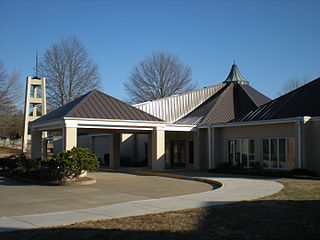
Hanover Lutheran Church is a Lutheran congregation in Cape Girardeau, Missouri, that is a member of the Lutheran Church–Missouri Synod. The congregation's original organization came about in 1846 as a result of the heavy German immigration to Missouri in the 19th century. The church's name, "Hanover", was chosen to reflect the place of origin of the majority of its members, since many of the Germans who had settled northwest of the town of Cape Girardeau had immigrated from Hanover, Germany.
Lutheranism was first introduced to Mexico in the 1850s, when German-American Lutherans began serving German immigrants in Mexico, though mission work among the non-German population in Mexico did not begin until the 1940s. Today there are five Lutheran church bodies in Mexico—the Mexican Lutheran Church, the Lutheran Synod of Mexico, the Confessional Evangelical Lutheran Church—Mexico, the Evangelical Lutheran Church of Mexico (unaffiliated), and the Lutheran Apostolic Alliance of Mexico (unaffiliated)—and several independent congregations.
The Lutheran Synod of Buffalo, organized on June 25, 1845, in Milwaukee, Wisconsin, by four pastors and 18 lay delegates as the Synod of Lutheran Emigrants from Prussia, was commonly known from early in its history as the Buffalo Synod. The synod resulted from the efforts of pastor J. A. A. Grabau and members of his congregation in Erfurt, along with other congregations, to escape the forced union of Lutheran and Reformed churches in Prussia by immigrating to New York City, Albany, and Buffalo, New York, and to Milwaukee, Wisconsin, in 1839. Grabau and the largest group settled in Buffalo.

Concordia College was a Lutheran college and high school in Conover, North Carolina. Founded as a high school by members of the Evangelical Lutheran Tennessee Synod in 1878, it added college courses in 1881. The English Evangelical Lutheran Synod of Missouri and Other States took over control of the school in 1893. Control passed to the Lutheran Church–Missouri Synod when the English Synod merged with it in 1911. In April 1935, a fire destroyed the main building, and the school closed permanently at the end of the spring semester.
The New York Ministerium, also known as the Ministerium of New York, was an early Lutheran synod founded in 1786 in the U.S. state of New York. Throughout its history there were theological controversies that led to congregations withdrawing from it to form new synods. In 1917, it became part of the United Lutheran Church in America, which is one of the predecessor bodies of today's Evangelical Lutheran Church in America.
38°28′37″N82°38′41″W / 38.4769°N 82.6446°W